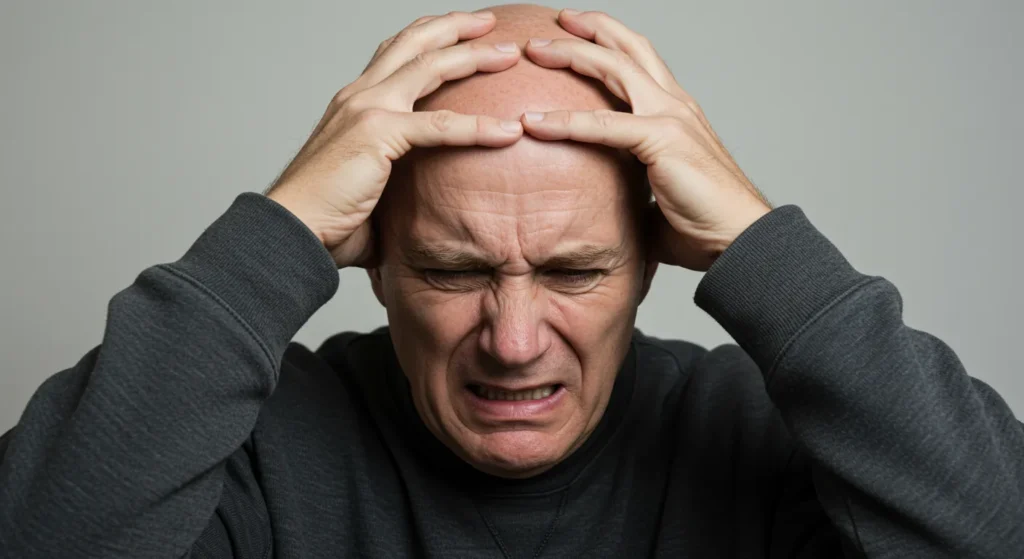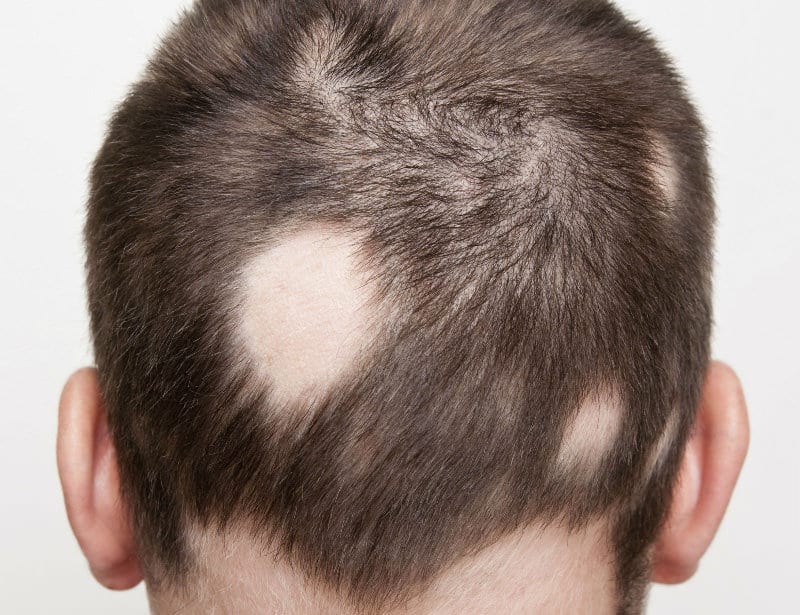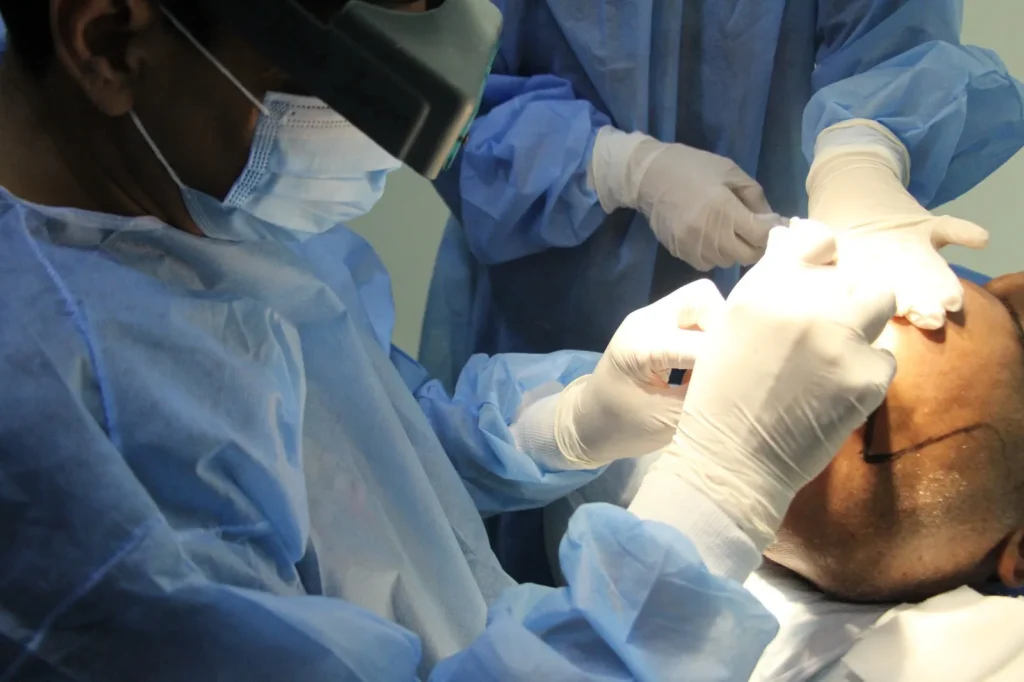Are you noticing more hair on your pillow or shower drain? Stress Triggers Hair Loss in Men. When mental or physical pressure builds up, it can disrupt your hair growth cycle, leading to sudden thinning, shedding, or even bald patches.
In this article, you’ll learn exactly how stress causes hair loss, what types affect men most, how to recover your hair naturally or with treatment, and when to seek expert help. Backed by science and medical insight, this guide helps you take the first confident step toward healthy regrowth.
Understanding the Link Between Stress and Hair Loss in Men

Can stress really cause hair loss in men?
Yes, stress can significantly impact your hair health. While male pattern baldness is usually driven by genetics and hormones, emotional or physical stress can trigger abrupt shedding or worsen existing hair loss. Understanding this connection is the first step toward effective treatment.
How stress affects your hair growth cycle
Hair grows in a cycle:
- Anagen (growth)
- Catagen (transition)
- Telogen (resting/shedding)
Stress disrupts this cycle by pushing more hairs into the telogen phase, leading to noticeable shedding. This is especially true in Telogen Effluvium, a condition often triggered by stress.
Common signs of stress-related hair loss
- Sudden thinning or excessive shedding
- Hair falls in clumps during showering or brushing
- Patchy bald spots (in more severe cases)
- Noticeable scalp visibility within weeks of a stressful event
Types of Hair Loss Linked to Stress
Telogen Effluvium
This is the most common type of stress-induced hair loss. It typically occurs 2–3 months after a stressor and results in diffuse thinning across the scalp. Fortunately, it’s usually temporary and reversible.
Alopecia Areata
In this autoimmune condition, stress may trigger the immune system to attack hair follicles, causing patchy bald spots. Recovery varies based on severity and response to treatment.

Trichotillomania (Hair-Pulling Disorder)
Some men deal with stress by compulsively pulling out their hair, especially during anxiety or tension. This psychological condition requires behavioral therapy for improvement.
Is stress making male pattern baldness worse?
Yes. While androgenetic alopecia is genetic, chronic stress can accelerate it, especially by increasing inflammation and hormonal imbalances like elevated cortisol levels.
What Triggers Stress-Induced Hair Loss in Men?
Psychological stress
Emotional upheavals — such as work burnout, breakups, or trauma — are major triggers. Chronic anxiety or depression also plays a role in disrupting hair growth.
Physical stress
Illness, injury, surgery, or even extreme weight loss can shock the body and interrupt the hair cycle.
Nutritional deficiencies
Stress often reduces appetite or affects nutrient absorption, leading to deficiencies in iron, zinc, or vitamin D — all crucial for hair health.
Hormonal fluctuations and cortisol
Stress increases cortisol, the body’s primary stress hormone, which negatively impacts hair follicle health and can cause premature shedding.
How to Tell If Your Hair Loss Is Due to Stress
Symptoms to look for
- Widespread thinning instead of receding hairlines
- Sudden onset of hair fall (not gradual)
- Occurs a few weeks/months after a stress event
- Hair grows back in uneven lengths or cycles
Timeframe of shedding
Hair fall from stress often appears 2–3 months post-trigger and can last for up to 6 months, depending on severity and treatment.
Diagnostic tools and professional assessment
- Scalp examination
- Pull test (gentle tug to see hair count)
- Blood tests for hormonal or nutritional imbalances
- Dermatologist or trichologist consultation
Can Hair Grow Back After Stress-Related Hair Loss?
Recovery timeline for each type
- Telogen Effluvium: Hair regrowth typically begins within 3–6 months.
- Alopecia Areata: May take longer; recovery varies widely.
- Trichotillomania: Regrowth is possible once the behavior is controlled.
Natural regrowth vs. treatment assistance
Mild cases resolve on their own with stress management and nutrition. Moderate to severe cases may require topical treatments like Minoxidil or PRP therapy.
When to seek medical help
- If shedding continues beyond 6 months
- If hair loss includes bald patches or a receding hairline
- If accompanied by itching, inflammation, or scalp pain
Effective Treatments for Stress-Related Hair Loss in Men
Stress management techniques
- Cognitive Behavioral Therapy (CBT)
- Mindfulness and meditation
- Regular exercise and sleep hygiene
- Journaling or talk therapy
Hair restoration treatments
- Minoxidil (Rogaine) for topical stimulation
- PRP therapy to nourish follicles with growth factors
- FUE hair transplant for long-term baldness correction

Nutritional support and supplements
- Biotin, zinc, vitamin D, and iron
- Consider a hair-specific multivitamin under medical guidance
Lifestyle changes
- Improve diet and hydration
- Limit alcohol and smoking
- Get consistent restful sleep
What hair specialists recommend
- Don’t ignore early shedding — get it assessed
- Treat the root cause (stress, hormones, or nutrients)
- Combine medical and behavioral therapies for optimal outcomes
Frequently Asked Questions (FAQs)
How long does stress-induced hair loss last?
Typically, 3–6 months. It may persist longer if stress remains unmanaged or nutritional issues exist.
Can anxiety permanently damage hair follicles?
Not usually. But prolonged anxiety may worsen genetic hair loss. Early treatment helps prevent lasting damage.
Does exercise help or worsen stress hair loss?
Moderate exercise helps reduce stress and supports healthy hair. Overtraining, however, may increase cortisol levels and cause more shedding.
Should I take supplements for hair loss caused by stress?
Yes, but only after medical consultation. Over-supplementation without diagnosis can backfire.
Don’t Let Stress Take Your Hair
Stress is unavoidable, but hair loss doesn’t have to be. With early intervention, expert care, and the right strategies, most men can reverse stress-induced shedding. If you’re unsure whether your hair loss is caused by stress or something more serious, professional help is just one click away.
Ready to reclaim your confidence and hair? Book a consultation with Dr. Rana Irfan — ABHRS-certified hair restoration expert in Islamabad — and take the first step toward healthy, stress-free hair.
